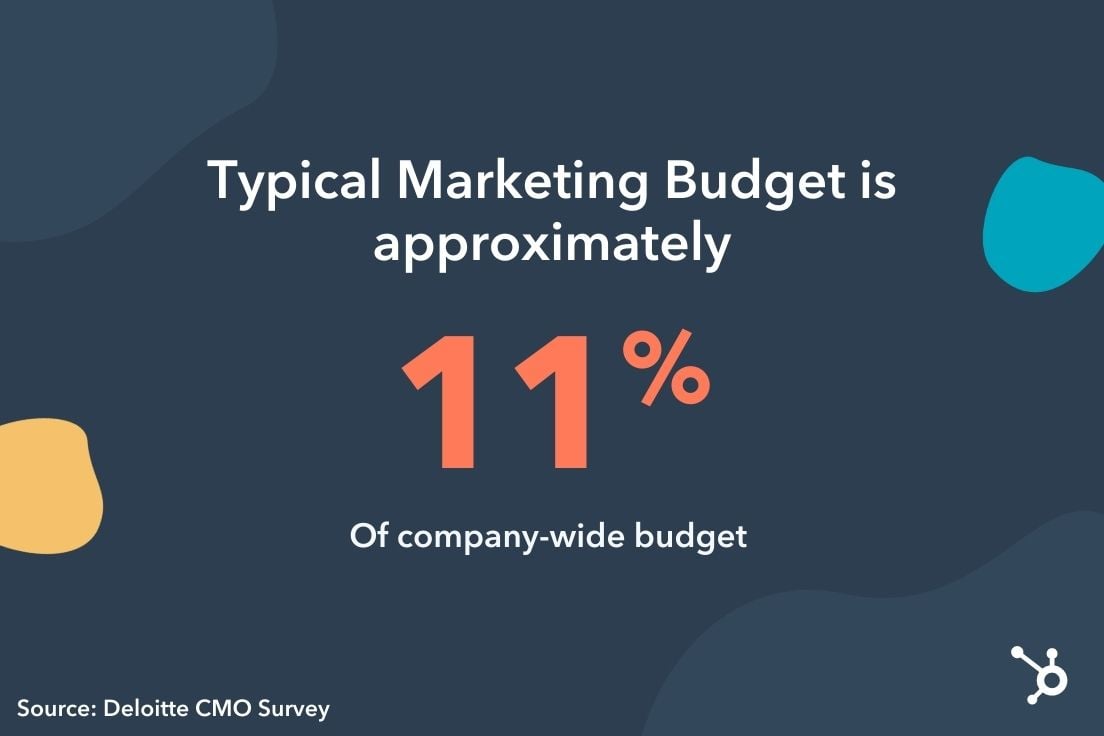When I was hired for my first marketing role, I got really excited to pitch new, exciting ideas to my team.
And I thought — as long as I had data to support the potential success of a project — that my team would be thrilled to hear these ideas.
Which they were. But they were also cautious, and one of their biggest concerns was, "Okay, this sounds great … but how much is it going to cost?"
Ultimately, being a successful marketer isn't just about thinking strategically. It's also about adhering to a strict budget, and achieving new levels of growth while simultaneously choosing the most cost-effective option for your business.
Here, we'll explore typical marketing budgets, as well as marketing budgets by industry, so you can determine how your budget matches up against competitors.
Plus, we'll explore how much of your yearly revenue you should re-invest in marketing materials to see stronger long-term growth.
What's a typical marketing budget percentage?
As of February 2021, Deloitte's annual CMO Survey reports that marketing budgets are now roughly 11.7% of total company-wide budget — a slight decrease from the 12.6% marketers saw in June 2020, but still a record high that most marketers haven't seen over the last four years.
(It's important to note, we saw record-high marketing budgets over the course of the pandemic as companies relocated some budget towards digital marketing strategies, rather than more offline tactics.)
Gartner's 2020 CMO survey confirms most marketing budgets rest around 11% of total company budget.
 While your own marketing department's budget depends on a variety of factors — including industry, company revenue performance, and business needs — this should help you ballpark a reasonable percentage of your total company-wide budget that you should allocate for your marketing teams.
While your own marketing department's budget depends on a variety of factors — including industry, company revenue performance, and business needs — this should help you ballpark a reasonable percentage of your total company-wide budget that you should allocate for your marketing teams.
Of course, what strategies/channels marketing teams choose to invest in varies depending on individual company goals. For instance, while 73% of companies invested in website optimization in 2020, only 20% invested in machine learning and automation.
Web optimization, digital media and search, and digital marketing were the top three priorities for companies when determining budget allocation in 2020 — with roughly 73%, 65%, and 57% of companies (respectively) investing in each.
These trends are predicted to continue into 2021 and beyond.
However, the data we've reported so far pertains to marketing budget percentage of overall company budget — but what about marketing budget as it pertains to overall company revenue? Let's dive into that, next.
Marketing Budget Percentage of Revenue
The U.S. Small Business Administration recommends small businesses (businesses with revenue less than 5 million) allocate between 7% and 8% of total revenue to marketing — assuming your business has margins in the range of 10-12 percent.
The amount of revenue businesses allocate to marketing has increased steadily over the past 10 years, with average marketing percentage of revenue landing around 13% in 2021, compared to just 8% back in 2011.
B2B Product industries allocate, on average, roughly 10% of revenue to marketing, which is similar to B2C Services (10.1%). B2B Services and B2C Product allocate higher numbers of 15% and 18%, respectively, of total revenue.
Of course, decisions related to marketing budget allocation remain largely industry-specific. To determine more accurate, industry-specific insights, let's explore marketing budgets by industry, next.
Marketing Budget Percentage by Industry [2021 Data]
Deloitte's 2020 CMO Survey found B2B (product-focused) companies attribute roughly 9.4% of overall budget to marketing efforts, while B2B (services-focused) companies attribute 11.4%.
Alternatively, if you work for a B2C (product-focused) company, Deloitte reports 15.9% of overall budget is the average given to marketing teams — for B2C (service-focused) companies, this is closer to 12%.
Of course, the type of business you work at (B2B or B2C) is only one factor when determining marketing budget percentage. Industry is a major factor, as well.
For instance, marketing expenses are highest in the Education sector at 19.4% of total budget — and they're lowest in the Energy industry, at roughly 4%.
If you work in the healthcare industry, you might expect to see a marketing budget around 7% of total budget.
Alternatively, consulting services typically attribute 13%. Lastly, technlogy/software platforms attribute 12% of total company budget to marketing.
If you're unsure how to manage your marketing budget, you're in luck. We've covered marketing budgets extensively in How to Manage Your Entire Marketing Budget [Free Budget Planner Templates]. Take a look at that post to create a marketing budget that works for you — and use templates and samples to get you started.
from Marketing https://blog.hubspot.com/marketing/marketing-budget-percentage
When I was hired for my first marketing role, I got really excited to pitch new, exciting ideas to my team.
And I thought — as long as I had data to support the potential success of a project — that my team would be thrilled to hear these ideas.
Which they were. But they were also cautious, and one of their biggest concerns was, "Okay, this sounds great … but how much is it going to cost?"
Ultimately, being a successful marketer isn't just about thinking strategically. It's also about adhering to a strict budget, and achieving new levels of growth while simultaneously choosing the most cost-effective option for your business.
Here, we'll explore typical marketing budgets, as well as marketing budgets by industry, so you can determine how your budget matches up against competitors.
Plus, we'll explore how much of your yearly revenue you should re-invest in marketing materials to see stronger long-term growth.
What's a typical marketing budget percentage?
As of February 2021, Deloitte's annual CMO Survey reports that marketing budgets are now roughly 11.7% of total company-wide budget — a slight decrease from the 12.6% marketers saw in June 2020, but still a record high that most marketers haven't seen over the last four years.
(It's important to note, we saw record-high marketing budgets over the course of the pandemic as companies relocated some budget towards digital marketing strategies, rather than more offline tactics.)
Gartner's 2020 CMO survey confirms most marketing budgets rest around 11% of total company budget.
 While your own marketing department's budget depends on a variety of factors — including industry, company revenue performance, and business needs — this should help you ballpark a reasonable percentage of your total company-wide budget that you should allocate for your marketing teams.
While your own marketing department's budget depends on a variety of factors — including industry, company revenue performance, and business needs — this should help you ballpark a reasonable percentage of your total company-wide budget that you should allocate for your marketing teams.
Of course, what strategies/channels marketing teams choose to invest in varies depending on individual company goals. For instance, while 73% of companies invested in website optimization in 2020, only 20% invested in machine learning and automation.
Web optimization, digital media and search, and digital marketing were the top three priorities for companies when determining budget allocation in 2020 — with roughly 73%, 65%, and 57% of companies (respectively) investing in each.
These trends are predicted to continue into 2021 and beyond.
However, the data we've reported so far pertains to marketing budget percentage of overall company budget — but what about marketing budget as it pertains to overall company revenue? Let's dive into that, next.
Marketing Budget Percentage of Revenue
The U.S. Small Business Administration recommends small businesses (businesses with revenue less than 5 million) allocate between 7% and 8% of total revenue to marketing — assuming your business has margins in the range of 10-12 percent.
The amount of revenue businesses allocate to marketing has increased steadily over the past 10 years, with average marketing percentage of revenue landing around 13% in 2021, compared to just 8% back in 2011.
B2B Product industries allocate, on average, roughly 10% of revenue to marketing, which is similar to B2C Services (10.1%). B2B Services and B2C Product allocate higher numbers of 15% and 18%, respectively, of total revenue.
Of course, decisions related to marketing budget allocation remain largely industry-specific. To determine more accurate, industry-specific insights, let's explore marketing budgets by industry, next.
Marketing Budget Percentage by Industry [2021 Data]
Deloitte's 2020 CMO Survey found B2B (product-focused) companies attribute roughly 9.4% of overall budget to marketing efforts, while B2B (services-focused) companies attribute 11.4%.
Alternatively, if you work for a B2C (product-focused) company, Deloitte reports 15.9% of overall budget is the average given to marketing teams — for B2C (service-focused) companies, this is closer to 12%.
Of course, the type of business you work at (B2B or B2C) is only one factor when determining marketing budget percentage. Industry is a major factor, as well.
For instance, marketing expenses are highest in the Education sector at 19.4% of total budget — and they're lowest in the Energy industry, at roughly 4%.
If you work in the healthcare industry, you might expect to see a marketing budget around 7% of total budget.
Alternatively, consulting services typically attribute 13%. Lastly, technlogy/software platforms attribute 12% of total company budget to marketing.
If you're unsure how to manage your marketing budget, you're in luck. We've covered marketing budgets extensively in How to Manage Your Entire Marketing Budget [Free Budget Planner Templates]. Take a look at that post to create a marketing budget that works for you — and use templates and samples to get you started.


No hay comentarios:
Publicar un comentario